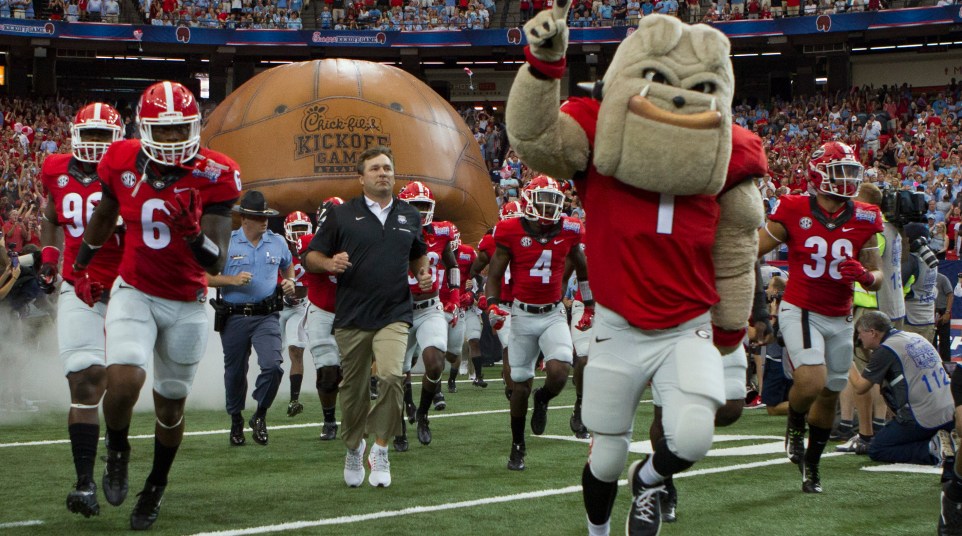
Year 2 will provide an important measuring stick for Kirby Smart Era at Georgia
When Kirby Smart was announced as the 26th coach in Georgia Bulldogs history, his press conference ended with a question about pressure and expectations. He responded with the following answer:
“(There is) no greater pressure than I put on myself, I can promise you that. That’s the way it should be. You put pressure on yourself and you demand excellence from everybody in your organization. We’re going to go out there and have the intent to win in every game we play.”
In 2017, his second campaign with the Bulldogs, the pressure on Smart will be amplified. He achieved a respectable 8-5 record in his debut season with a young roster, a true freshman quarterback and several razor-thin point margins.
That young talent is exactly the reason optimism abounds in Athens this spring. Several former elite prospects, including quarterback Jacob Eason, will have a year of experience, which should theoretically correlate to a higher level of play.
It’s Smart’s job to make sure that growth happens. He’s lived up to his reputation as a tremendous recruiter, landing the No. 8 and No. 3 classes in 2016 and 2017, respectively. Finding talent has never been a problem for Georgia, however, and Smart was hired to win in the fall, not on National Signing Day.
There are many fans who will say that Smart deserves at least three years to build a winning on-field product. That’s an understandable sentiment, but he inherited a consistent 10-win program and has added some nice pieces. Some of the best coaches in recent SEC memory have orchestrated a jump in production in their second year, which should be the expectation for Smart.
[table “” not found /]
The first-season average for the head coaches above equated to an 8-4 record, which essentially matches Smart’s accomplishment in 2016. Of course, both Nick Saban and Steve Spurrier had head coaching experience, which makes the comparison to Mark Richt the most compelling.
Not only did they have nearly identical first-year records, but they built talented rosters headlined by a young, promising quarterback.
It is undoubtedly a bit too optimistic to expect Smart to have the same second-year improvement that Richt enjoyed, especially in today’s SEC landscape, but a 10-win season should be an achievable goal. To generate the type of success Bulldogs fans are anticipating, Smart will need to prove he can avoid some of the pitfalls that Richt’s teams fell into.
Most obvious is beating the Florida Gators. Although Richt was relatively successful against Georgia’s rivals – he was 37-22 against Auburn, Florida, Georgia Tech and Tennessee – he was just 5-10 against the Gators.
Perennial contenders in the SEC East themselves, the Gators are a roadblock each season. Richt didn’t manage to beat Florida until his fourth season, something fans don’t want to see happen with Smart.
In 2017, Georgia is the favorite to win the division for the first time since 2012. Florida and Tennessee will factor into the mix as well, though, with Kentucky and South Carolina also with the potential to make noise. Smart went 0-2 against the Gators and Vols in his first season and 1-3 against Georgia’s main rivals. If the Bulldogs are to reach Atlanta, he will need to reverse that trend.
The other major problem during Richt’s latter years was a troubling propensity to drop a game they had no business losing. No-show losses can prevent a program like Georgia from becoming a national contender on an annual basis.
An inexcusable loss to Vanderbilt in the seventh game last year put a serious dent in Georgia’s division title hopes. The play that sealed the loss — a 4th-and-1 pitch to Isaiah McKenzie that was stuffed immediately — raised plenty of eyebrows.
For some, that loss could be chalked up as a learning moment for a rookie head coach and a relatively inexperienced team; some pointed to Alabama’s home loss against Louisiana-Monroe in Saban’s first season as a defense of sorts for Smart.
For others, it was just the latest in a series of head-scratching defeats — new coach, same result.
It might be unfair to continue to compare Smart with his predecessor. After all, he was not a part of the old regime and has brought an entirely new mindset to the program. Those ghosts still linger in the minds of fans, however, and winning is the only way to dispel them. That’s the job Smart signed up for.
In Year 1, Smart was correct in saying that most of his pressure was internal. As his second season slowly approaches, that is no longer the case. Georgia has the burden of expectation on it in 2017, and the pressure that comes along with it.
Both Richt and Saban proved they were up to the task in Year 2. Now, it’s Smart’s turn to make that leap.
